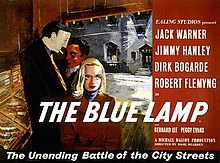
Back The Blue Lamp Welsh The Blue Lamp Esperanto La Lampe bleue French I giovani uccidono Italian Den blå lykten NB Синяя лампа (фильм) Russian The Blue Lamp Serbo-Croatian Синя лампа (фільм) Ukrainian
| The Blue Lamp | |
|---|---|
 Original UK quad poster by James Boswell | |
| Directed by | Basil Dearden |
| Screenplay by | T.E.B. Clarke |
| Based on | Original treatment by Jan Read and Ted Willis |
| Produced by | Michael Balcon |
| Starring | Jack Warner Jimmy Hanley Dirk Bogarde Robert Flemyng |
| Cinematography | Gordon Dines |
| Edited by | Peter Tanner |
| Music by | Ernest Irving Jack Parnell (uncredited) |
Production company | |
| Distributed by | General Film Distributors |
Release date |
|
Running time | 85 minutes[2] |
| Country | United Kingdom |
| Language | English |
| Budget | £142,304[3] |
| Box office | £246,000[4] |
The Blue Lamp is a 1950 British police procedural film directed by Basil Dearden and starring Jack Warner as PC Dixon, Jimmy Hanley as newcomer PC Mitchell, and Dirk Bogarde as criminal Tom Riley.
The title refers to the blue lamps that traditionally hung outside British police stations (and often still do). The film became the inspiration for the 1955–1976 TV series Dixon of Dock Green, where Jack Warner continued to play PC Dixon until he was 80 years old (even though Dixon is murdered in the original film).
The screenplay was written by Ealing regular T. E. B. Clarke, who had been a war reserve constable. The film is an early example of the "social realism" films that emerged later in the 1950s and 1960s, sometimes using a partial documentary-like approach. There are also cinematic influences of the film noir genre, particularly in underworld scenes featuring Bogarde's Tom Riley, such as the pool rooms and in and around the theatre, making deliberate use of genre trademarks like slow moving low camera angles and stark lighting. The plot, however, follows a simple moral structure in which the police are the honest guardians of a decent society, battling the disorganised crime of a few unruly youths. The film was set in London, and partly shot on locations there.
- ^ Cite error: The named reference
Odeonwas invoked but never defined (see the help page). - ^ BBFC: The Blue Lamp - runtime 03/11/1949 Linked 2015-04-22
- ^ Chapman, J. (2022). The Money Behind the Screen: A History of British Film Finance, 1945-1985. Edinburgh University Press p 356.
- ^ Harper, Sue; Porter, Vincent (2003). British Cinema of The 1950s The Decline of Deference. Oxford University Press USA. p. 281.